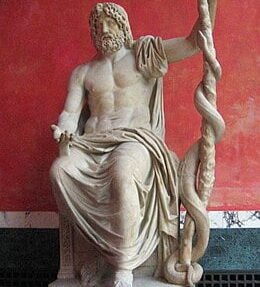Contenus
ToggleIn short
The cult of Asklepia in honor of Asklepios the healer and son of Apollo was introduced to Athens in 429 (8 Elaphebolion) BCE from Epidauria and in a short time he was given a temenos on the hill of the Akropolis next to the temenos of Dionysus.

Asklepia, in honor of the healing god
Although not directly associated with Dionysus in the myth, he received a festival at or during the time of the city Dionysia that month, perhaps because of the efforts of Sophocles, then a leading tragic poet. Such was the importance of Asklepios that his other festival took place around the time of another major Athenian festival, the Eleusinian Mysteries.
Non-venomous snakes were left to crawl on the floor in dormitories where the sick and injured slept. From around 300 BC, the cult of Asclepius became very popular. His healing temples were called asclepieion; pilgrims flocked to them to be healed. They slept through the night and reported their dreams to a priest the next day. He prescribed a cure, often a visit to the baths or gymnasium.
THE Greeks did not separate the healing potential of technology (techne) from that of the mind (psyche). As the 4th century CE philosopher Sallustius wrote, “divinations and healing of the body take place from the beneficent providence of the gods” (chapter 9).
Social networks
On this day, the Athenians celebrated Asklepia in honor of the god of healing and medicine. Purification rites allowed pilgrims to begin treatment to treat illnesses. #mythology #myth #legend #calendar #8elaphebolion #asklepia #asklepios #Athens
Picture
